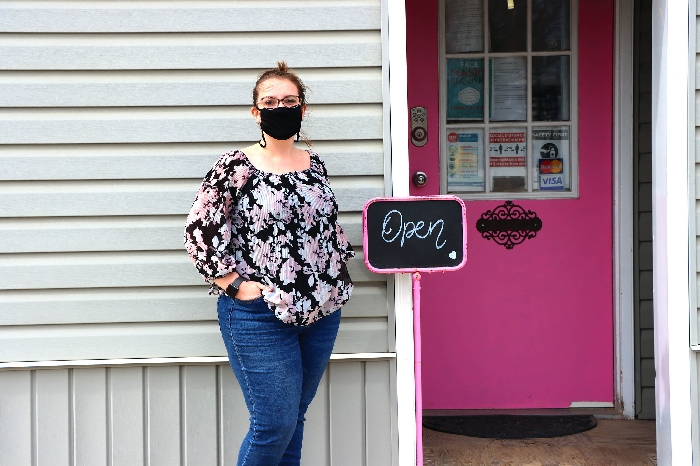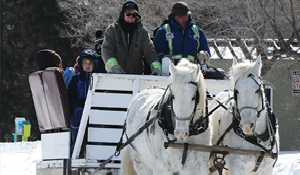‘It’s absolutely not fair’—Rural Manitoba businesses feel the impacts of third lockdown
May 17, 2021, 4:15 pm
Spencer Kemp, Local Journalism Initiative Reporter


New COVID-19 restrictions took effect on Sunday, May 9 in Manitoba.
These new restrictions saw restaurants, bars, and patios restrict service to take-out and delivery services only.
Gyms and fitness centres closed as well as casinos, VLTs, museums, galleries, and libraries.
Indoor community, cultural, and religious gatherings were prohibited alongside indoor sports and recreation activities. Outdoor sports and recreation activities were limited to a maximum of five participants and organized teams were not permitted.
Retail stores, markets, and garden centres were able to open at a 10 per cent capacity, and personal services, such as salons were closed.
These new restrictions marked a third lockdown for the province, which has served as another blow to small and rural businesses.
Kristina’s Salon says restrictions are unfair
For some businesses, the new measures only limited maximum capacity.
But for others, the new measures meant closing the doors.
Kristina Walker, owner of Kristina’s Salon in Elkhorn, Manitoba, says that with the new restrictions put in place by the Government of Manitoba, she is out of a job.
“Basically the impact is that I’m out of my job for a third time. Completely. I have no income,” Walker said.
“There is the Manitoba Bridge Grant, which they’ve done for the third time. It gives businesses a lump sum of $5,000 for the three-week closure period to help cover the costs. I do own my building, but there’s the maintenance, utilities, and other stuff that doesn’t stop.”
Because she owns the building that she operates her business out of, Walker says the money through the Manitoba Bridge Grant will be enough for her to keep afloat until May 30 when the restrictions will be reviewed and potentially lifted.
“It will be okay. I was in the process of taking some more training and doing some more education which included having to buy more equipment and supplies, which I’ve had to slow down. I was also in the beginning of renovations, so I’m hoping that I can still keep up with that.”
But even with the grant, Walker says the lockdowns are taking a financial toll.
“It’s definitely taking a huge toll on my business, which is my source of income which affects my personal life here at home. I have a son and my boyfriend is still able to work, so I depend on him a bit more which sucks.”
Unsure of how long the pandemic will last and if the restrictions will continue to open and close her business, Walker says she has considered closing her doors permanently, but her love for the job keeps them open.
“I’ve considered having to close. Why not just quit and give up now? We don’t know how long this is going to go on. It’s great that the government has given us some financial aid, and in my case that amount is helpful. But I don’t really know what the future holds for sustaining my business. It kind of seems like I’m off for three months then open for four. The last time they shut us down was in November and it was just supposed to be a few weeks but then lasted three months. I’m trying to stay positive, but as soon as they start rolling out that financial aid we know it’s not just going to be three weeks. This is how it happened in the past.
“I think about quitting and not doing anything, but I do enjoy my job,” Walker explained.
She says she feels the blanket restrictions are unfair to small, rural businesses.
“It’s absolutely not fair. Every business has done everything they can to stay open. They’ve monitored people coming in, contact information, limiting how many people can come in at once. Of course, they would do anything to keep their business running and to be able to have income and also to be able to provide those services because people obviously want them. I don’t think it’s fair in any case. I can’t drop my numbers below one person at a time, and I feel that for one person at a time to not be able to come into my salon where everything is disinfected afterward, but I can go to Walmart where nobody takes any information from me or monitors what I touch, it’s not fair. They say that’s safe but a place like my salon is not. It’s not fair at all.”
Walker says that the tightened restrictions will only prompt consumers to seek services elsewhere, noting that Elkhorn’s proximity to the border means more Manitobans will spend their money in Saskatchewan instead.
“People will go elsewhere. They’re being pushed to other places. They’ll just cross the border and go to Moosomin or wherever. So it’s hard to realize that people are doing that,” Walker said.
Samantha’s Boutique thankful to be open
Other businesses have been fortunate to remain open through the new COVID-19 restrictions.
Samantha Cluett, owner of Samantha’s Boutique in Elkhorn, Manitoba, says that when she first heard of the restrictions taking effect, she assumed that her business would need to close once again.
“When those announcements came out I assumed that I was going to be closed, and I thought that was it. Usually, I am really grouchy about the restrictions, but this time I was relieved because I got to stay open where so many don’t have that opportunity. I really haven’t had a chance to think about how it will affect me, I’m just thankful I can stay open and I will make it work. It is what it is,” Cluett said.
“I feel for the ones who are closed, though. That hurts my heart. I don’t understand why I can be open at ten per cent capacity but the likes of a hair salon or nail salon have to be closed when they can be one-on-one.”
While able to keep her trendy pink door open to the public, Cluett says it will be difficult to limit how many people are permitted in the building, which is currently five.
“The 10 per cent capacity is going to be a struggle, but I’m open. For me, I thought we would be closed again, but we’re open. I’m thankful and I’m going to push our online sales and we can control who is in our store and how many are in our store. I feel good, I can operate, I can make it work. But I have seen Facebook posts from friends who are in business and lots are doing shopping by appointment only to help them manage that capacity.
“For a small town, five people is very achievable and we can manage with it. But I remain infuriated for the ones who are also in a small town who could also manage the limited capacity but had to close. I can have five people in my place, but salons can’t do things one-on-one. I don’t understand how that is not okay.”
She says that with the southwest corner of Manitoba, there are minimal COVID-19 cases and she believes that the restrictions are unfairly affecting businesses in Elkhorn and other rural communities.
“I don’t know if the people making these decisions have ever been in rural Manitoba.
“We don’t have the cases to warrant this.”
One benefit that Cluett noted was her business’s adaptation to an online platform. She says it was something that she had considered before the pandemic.
“It pushed us out of our comfort zone and it got us online which was something we always said we might do but had never tried it. We go live on Facebook every second Wednesday and we’re selling online and have really connected with our online customers. That was our biggest adaptation. Over Christmas, we were closed for three months, which is our busiest season, so we had to adapt fast.”
Cluett says that her business has seen a drop in income through the pandemic and has had to utilize both the Manitoba Gap Protection Program, a one-time grant of $6,000, and the Manitoba Bridge Program, a grant of $5,000 that has been made available for Manitoba businesses three times through the pandemic.
While Cluett says she is happy that her business is open, she believes that the restrictions that have been put in place should be limited to areas that are seeing high numbers of COVID-19 cases.
“I feel like we’ve held our own. Given everything we have faced in the last year, we have held our own. But I keep going back to us being open, which is a crazy thing, small businesses shouldn’t need to be this excited about being open.
“It’s just frustrating. Elkhorn, Manitoba cannot be treated the same as Winnipeg. We’re not the same, we’re very different. I do believe that restrictions could be handled by area,” Cluett said.
Virden Boston Pizza lays off staff
The food industry in Manitoba has been forced to adapt rapidly through the ongoing COVID-19 pandemic, adapting to limited seating capacity to patio seating only to delivery only.
With the new restrictions that took effect on Sunday, May 9, all restaurants had to limit their services to take-out and delivery options.
Jillian Irvine, owner of the Boston Pizza in Virden, says the newest lockdown is presenting unique challenges, just as the other two had.
“This is our third lockdown. Each lockdown has presented its own unique challenges because there have been so many different variables that play into what’s driving the consumer to spend their disposable income on items such as eating out. This particular lockdown presents some challenges because the pandemic has gone on for so long. It’s financially impacting so many people and it’s been so devastating because there have been so many different businesses shut down for such a long period of time that it’s affecting all of us,” Irvine said.
While Irvine says she wishes the restrictions could be enforced by region, she understands the difficulty of doing so.
“I do know that when they did try to do the regional thing, what happened was a whole bunch of people from Winnipeg coming to Brandon to do their shopping and to go out. But on the other hand, from a rural perspective, so many businesses have done everything they needed to do to stay safe. Hair salons and so many different businesses that have been able to maintain the proper COVID protocol to continue to operate and have spent thousands of dollars making sure that they are keeping their customers safe, so that is a bit disappointing.
“On the other hand, I have respect for the frontline workers and the healthcare professionals and they’ve asked us to buckle down for the next few weeks to help them get what they need to get done to get through this pandemic.”
Because of the new restrictions, Irvine had to lay off around half of her front-of-house staff but was able to keep the kitchen staff employed.
She says she is concerned about the staff returning when the lockdown measures lift.
“The biggest concern on my mind is restarting our industry for the third time. For example, so many servers might not come back for a third time to this industry and they might have moved on to other industries that are less of a risk of losing their jobs because their employment has been so inconsistent throughout this pandemic. That is my biggest concern.
“The other thing I’m battling with is that there are so many summer job programs out there that seasonal operations have been able to take advantage of that the students have gone on to take those jobs because they’re guaranteed employment through the summer. So when we are allowed to reopen, I think that everyone in our industry is going to be struggling for staff and wondering if the staff will actually be there.”
She says the ever-evolving restrictions have been difficult to manage as a business owner.
She says that the restrictions do not give much time for adaptation but she and her staff are doing their best.
“It’s just been a roller coaster of trying to predict what will happen. As a business owner, you have to be proactive with your business, and I think the most frustrating thing for me is that it forced us over this last year to be in a reactive position. We can’t predict how the pandemic is going to evolve and what kind of restrictions the government is going to put on us. We just have to do whatever we can to keep moving forward and keep positive for our employees and our customers.”
Irvine notes that if the restrictions remain in place, she anticipates customers will drive to Saskatchewan to eat.
“When we’ve had tougher restrictions a lot of our customers have just been going to Saskatchewan to dine. So that’s been tough to manage,” Irvine said.



































